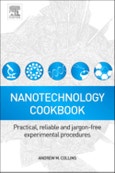The peculiarities of materials at the nanoscale demand an interdisciplinary approach which can be difficult for students and researchers who are trained predominantly in a single field. A chemist might not have experience at working with cell cultures or a physicist may have no idea how to make the gold colloid they need for calibrating an atomic force microscope. The interdisciplinary approach of the book will help you to quickly synthesize information from multiple perspectives.
Nanoscience research is also characterized by rapid movement within disciplines. The amount of time it takes wading through papers and chasing down academics is frustrating and wasteful and our reviewers seem to suggest this work would give an excellent starting point for their work. The current source of published data is either in journal articles, which requires highly advanced knowledge of background information, or books on the subject, which can skim over the essential details of preparations. Having a cookbook to hand to flick through and from which you may select a preparation acts as a good source of contact both to researchers and those who supervise them alike.
This book therefore supports fundamental nanoscience experimentation. It is by intention much more user-friendly than traditional published works, which too-frequently assumes state of the art knowledge. Moreover you can pick up this book and find a synthesis to suit your needs without digging through specialist papers or tracking someone down who eventually may or may not be able to help. Once you have used the recipe the book would then act as a reference guide for how to analyze these materials and what to look out for.
Please Note: This is an On Demand product, delivery may take up to 11 working days after payment has been received.
Table of Contents
1. Introduction2. Safety
3. Common Analytical Techniques for Nanoscale Material
4. Chemical techniques
5. Physical techniques
6. Biological Nanotechnology








